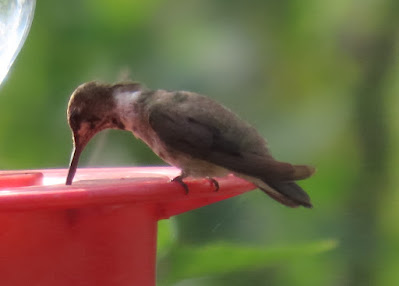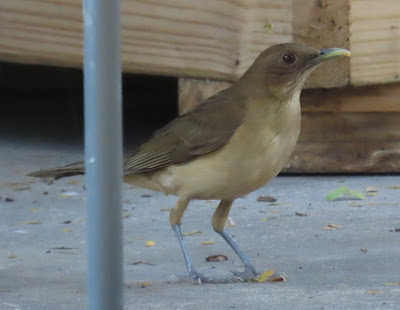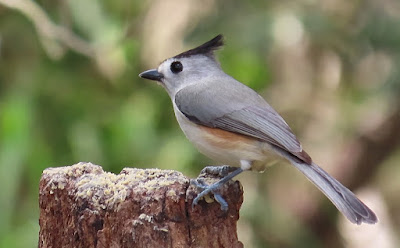2/21/22
My first words to Liz from New Mexico and her friend Karen from Dallas as they pulled into the parking lot at Estero Llano Grande were, “There goes a Ringed Kingfisher!!” Unfortunately, they both missed it, of course, but they took it in stride; both were rather laid-back birders who were happy to see whatever came by! Karen was a beginner, so everything was a new delight, whereas Liz had only been to the Valley once before to visit relatives (and was not a birder at the time, so she only remembers seeing a Green Jay J). We had opted to meet each other at the park due to COVID concerns, so after we all got our stuff together, we headed on in, deciding to take a quick peek first to see if “Pam in the Palm” (one of our resident “McCall’s” Screech Owls) was in her box! (She received that moniker as her usual roost was next to a palm tree, but she moved…maybe it’s time to change her name to “Barb in the Box”…) She/he/it wasn’t there, but we nailed their first Valley (Texas, really) specialty, a Golden-fronted Woodpecker, on a power pole! A funny call note I couldn’t place coming from a bush at our feet had me convinced we might have a Winter Wren, but before long the bird started saying something I recognized (besides having a “family member” calling nearby) and briefly showed itself, proving to be a Carolina Wren! We then headed down the brick walkway where we picked up a singing Long-billed Thrasher (a good example of being almost within touching distance but practically invisible)!
The girls spotted some Black-bellied Whistling Ducks actually on the roof of the building next to the “restroom feeders” (we later saw a couple actually on the log feeder), and indeed most of the had vacated Ibis Pond. We had a few ducks: Shoveler, both Blue-winged and Green-winged Teal, some Gadwall, and a pair of Mottled Ducks. A Least Grebe kept playing hide and seek behind a log, and a quartet of Snowy Egrets fed across the way, along with a couple of Common Gallinules. We checked out Avocet Pond and found the Gadwall/Pintail hybrid, but no Fulvous Whistling Duck. A few Kiskadees came into the tree full of redwings across the way, and they were definitely a hit, especially after they were joined by an Altamira Oriole!
Swinging around the boardwalk we added a Caracara
keeping pace ahead of a Turkey Vulture, then headed to Curlew Pond with nothing
to show except a Lincoln’s Sparrow. Dowitcher
Pond was pretty quiet on the southern end as well (although we did heard
avocets on the other side of the levee).
As we headed towards Alligator Lake a White-tailed Kite just performed
beautifully (easy for him to “kite” in the wind as it kicked up), and Soras
called from the reeds. At the north end
we found more ducks, Coots, and gallinules, but nothing unusual. The sun came out about then, and the black
sky to the north was quite dramatic!
Karen and Liz head down the Wader's Trail
Lincoln's Sparrow
White-tailed Kite
Grebe Marsh was empty of life as well (except for a
Red-eared Slider), but all the action appeared to be at Alligator Lake: both flavors of night herons came through,
along with a Green Heron that spooked, and a Tricolored Heron sitting stoically
across the way. A Snowy Egret was having
a “bad hair day”, and an Anhinga dried his wings, offering the opportunity to
explain why they did that! (No oil
glands to keep their feathers waterproofed…)
The Ringed Kingfisher shot silently overhead, but unfortunately the
girls only saw the blob… More Least
Grebes gave point-blank looks, and we were entertained by a Pied-billed Grebe
gagging down a fish as big as his head!
We started the Pauraque Prowl, and thankfully didn’t have to go far before I spotted him (with a sigh of relief)! He was definitely a hit! The big overlook gave us a Neotropic Cormorant that kept flying circles over us, while another Anhinga sat on a picturesque branch against the sky (and here was where Karen discovered that something had “decorated” her… L)! Heading back to the visitor’s center several Tree Swallows circled overhead, and four White Pelicans sailed by, a couple starting to get their bill horns! Had more views of the kite, and after checking in and using the facilities, we headed into the Tropical Zone.
Obligatory Pauraque shot
Obligatory "enjoying the Pauraque" shot
Right away we headed over to Park Hosts Susan and
Steve’s feeders and “changed the guard” with a couple who said it was “rather
dead”, but I talked the girls into giving it at least ten minutes for the birds
to get used to you (normally I give it 15 but many people don’t have the
patience). It was indeed rather dead to
start with, but the minute my timer went off the place exploded with
birds: Orange-crowned Warblers came down
to the PB log, an Altamira Oriole came in to the nectar feeders (and the suet cake),
a female Black-chinned Hummer came in to that feeder (the combination of flopping tail, long bill, and blobby outer
primary sold me), and several Clay-colored Thrushes suddenly bounced around and
under the RV! What a show!
Steve and Susan's feeder area
Then we checked in on “Pam”, and there she
was! I explained why they should put
this one in the “bank” in case the powers that be decide to split the
“McCall’s” off from the standard Eastern Screech Owl as we made our way to the
Indigo Blind. A treefull of
Black-crested Titmice (and a single Blue-gray Gnatcatcher) distracted us, but
there was nothing at the “Picnic Table Feeders”, so we headed on over to the
blind. A “pupping” sound betrayed the
presence of an unseen Couch’s Kingbird, but before long he darted out, caught
himself a bee, and landed right over our heads!
Nice show!
Ida, one of our Winter Texan fixtures around the Valley J, was already in the blind and reported an Olive Sparrow that had been on a log. Again, I insisted on giving it at least 15 minutes this time, and while it was slow to begin with, we eventually got looks at both Golden-fronted and Ladder-backed Woodpeckers, Black-crested Titmice, both Ruby-throated and Buff-bellied Hummingbirds (plus an Archilochus hummer that seemed to have characteristic of both), and finally a brilliant Green Jay (who was banded)! Ida’s hubby Ty came in, and shortly after a Kiskadee came to take a drink and yelled the “all clear”, the place exploded with activity: Clay-colored Thrushes, Chachalacas, White-tipped Doves, and even the Olive Sparrows all came in! A Green Jay alarm sent everyone except a statuesque Clay-colored scrambling (I heard a Red-shouldered Hawk in the distance, but I doubt that was the source of the scare), so we used that opportunity to go see the nesting Great Horned Owl. I had seen it twice before so I was a little nonplussed when I couldn’t find the thing (you have to be standing in just the right spot), but finally spotted Momma with the fluffy chick high in the tree! What a treat!
We called it a day after that with 62 species for
the morning, which is pretty decent!
Bird list:
Black-bellied Whistling-Duck
Blue-winged Teal
Northern Shoveler
Gadwall
Mottled Duck
Northern Pintail
Gadwall x Northern Pintail (hybrid)
Green-winged Teal
Plain Chachalaca
Least Grebe
Pied-billed Grebe
White-tipped Dove
Common Pauraque
Ruby-throated Hummingbird
Black-chinned Hummingbird
Buff-bellied Hummingbird
Sora
Common Gallinule
American Coot
American Avocet
Killdeer
Anhinga
Neotropic Cormorant
American White Pelican
Great Egret
Snowy Egret
Tricolored Heron
Green Heron
Black-crowned Night-Heron
Yellow-crowned Night-Heron
Turkey Vulture
White-tailed Kite
Red-shouldered Hawk
Eastern Screech-Owl
Great Horned Owl
Ringed Kingfisher
Golden-fronted Woodpecker
Ladder-backed Woodpecker
Crested Caracara
Great Kiskadee
Couch's Kingbird
White-eyed Vireo
Green Jay
Black-crested Titmouse
Tree Swallow
Blue-gray Gnatcatcher
House Wren
Marsh Wren
Carolina Wren
European Starling
Long-billed Thrasher
Northern Mockingbird
Clay-colored Thrush
House Sparrow
Olive Sparrow
Lincoln's Sparrow
Altamira Oriole
Red-winged Blackbird
Great-tailed Grackle
Orange-crowned Warbler
Common Yellowthroat
Northern Cardinal



























No comments:
Post a Comment